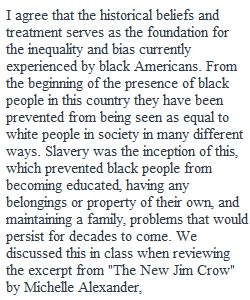


Q Once you have completed all of the course materials, please submit your primary (20 points) and secondary (15 points) responses. Be certain to use the format listed when you create your responses. During Weeks #7 adn 8 your course materials discussed various targets of hate crimes in America. Your readings focused on African-Americans as targets of hate crimes. By viewing the statistics from UCR and NCVS, it is clear that race, more specifically, anti-Black racial bias, is consistently the largest target group in America. Using the course materials (such as Frederick Douglas, Michelle Alexander, Gerstenfeld, and Petrosino) please respond to the following question: This week's course materials focused on Black Americans as a targeted group for hate crimes. Your readings, videos, and podcast provided the historical context of bias, discrimination, and terror against Black Americans. Do you agree or disagree that the historical beliefs (bias) and treatment (discrimination and terrorism)--both individual and systemic--serve as the foundation for the inequality and bias experienced by Black Americans today? Why or why not? BE SPECIFIC AND GIVE EXAMPLES FROM YOUR COURSE MATERIALS TO SUPPORT YOUR POSITION.
View Related Questions